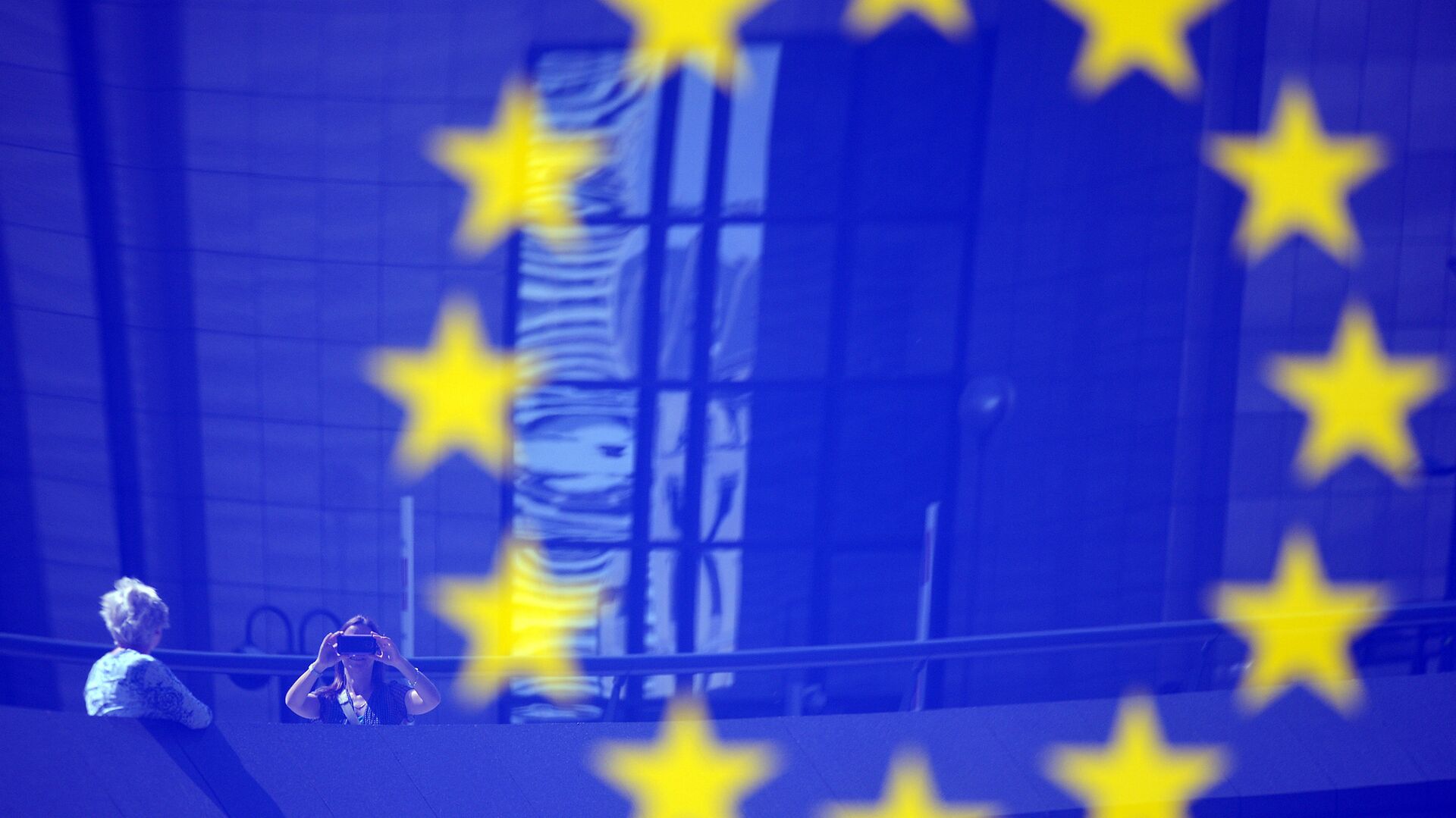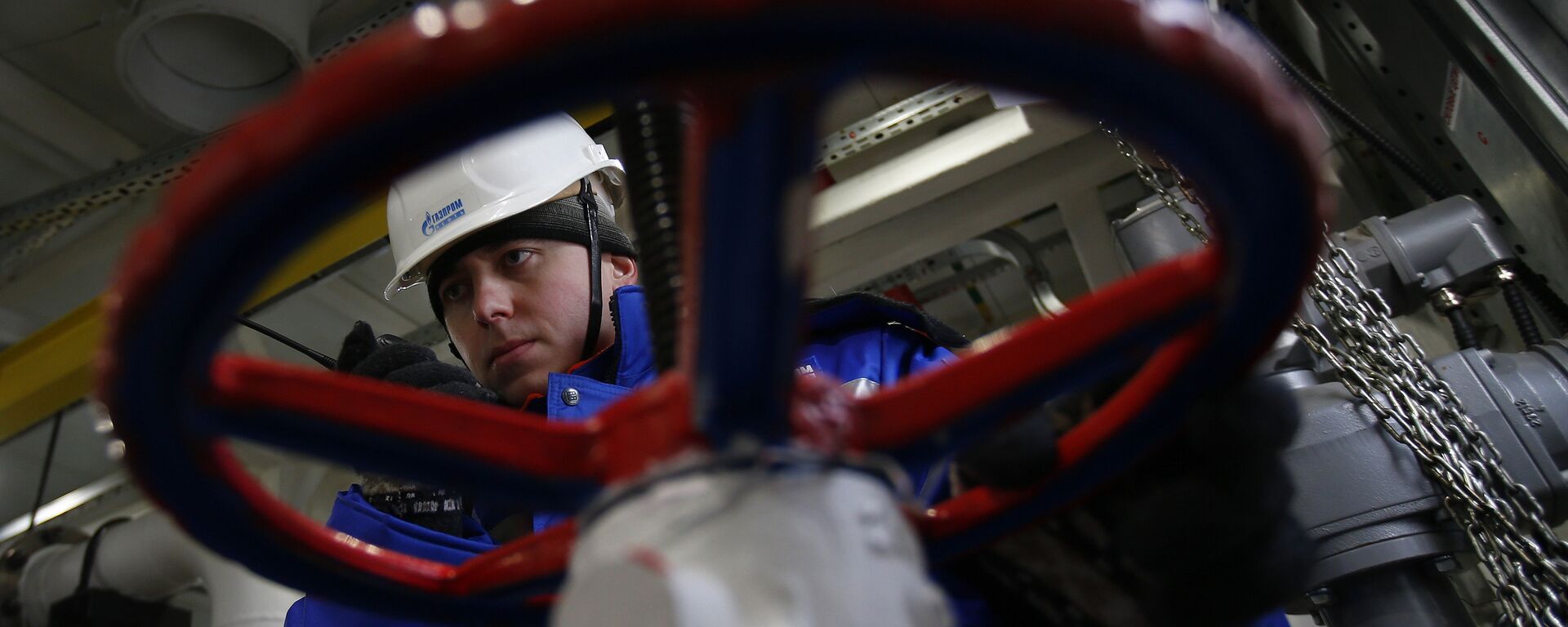https://sputnikglobe.com/20220508/eu-mulls-emergency-energy-sharing-plan-in-face-of-possible-full-stop-of-russian-supplies---report-1095343719.html
EU Mulls Emergency Energy Sharing Plan in Face of Possible Full Stop of Russian Supplies - Report
EU Mulls Emergency Energy Sharing Plan in Face of Possible Full Stop of Russian Supplies - Report
Sputnik International
On Monday, EU Commissioner for Energy Kadri Simson called on Brussels to speed up the deployment of renewable energy sources, warning that the bloc cannot... 08.05.2022, Sputnik International
2022-05-08T09:19+0000
2022-05-08T09:19+0000
2023-04-12T17:14+0000
russia
hungary
poland
bulgaria
gazprom
european commission
gas supplies
energy
plan
european union (eu)
https://cdn1.img.sputnikglobe.com/img/106128/54/1061285449_0:160:3077:1890_1920x0_80_0_0_64bd6ccecbcad575933e68dc80c2465f.jpg
The European Commission is due to approve an emergency energy sharing plan on 18 May to grapple with a possible abrupt interruption of Russian gas supplies to the bloc, the Spanish newspaper El Pais has reported.The blueprint will reportedly stipulate that energy rationing should be applied in such a way that companies in unaffected EU countries could not have a competitive advantage over the firms based in the bloc’s member states that may face cuts in energy supplies. El Pais pointed out that Brussels plans to use a 2017 regulation on the security of energy supplies in order to introduce measures that will guarantee the delivery of enough gas to households and essential social services in all EU countries.The EU’s blueprint envisages that each affected country can declare a national emergency and impose its own rationing rules. In addition, such nations are allowed to invoke the regulation’s solidarity-related clause, which would prompt unaffected countries to help provide them with gas supplies.According to the news outlet, the European Commission believes that of the 155,000 million cubic meters of gas that annually arrived from Russia, two thirds can be replaced. It means that about 50,000 million cubic meters would be missing, a figure that is tantamount to the 12-month gas consumption of Romania, Hungary, Austria, the Czech Republic, Slovakia, Estonia, Latvia and Lithuania.Earlier this week, EU Commissioner for Energy Kadri Simson urged Brussels to accelerate the deployment of renewable energy sources in a bid to resolve the issue of replacing imports of Russian gas.Since the beginning of Russia's special operation to "demilitarise and de-Nazify" Ukraine on 24 February, EU officials have introduced a spate of sanctions against Moscow, as well as pledging to dramatically reduce the 27-nation bloc's dependence on Russian oil, gas and coal. In early March, the EU announced plans to slash its dependence on Russian gas by two-thirds during 2022. Europe gets about 40% of its natural gas from Russia.Also in March, President Vladimir Putin instructed the government and Russian energy giant Gazprom to switch gas payments by countries that have imposed sanctions on Moscow to rubles. The decision was followed by Gazprom’s press service announcing in late April that the company had suspended gas supplies to Poland and Bulgaria due to the two’s refusal to pay for the fuel in rubles despite the fact that they were “duly notified”.Gergely Gulyas, the head of the Hungarian Prime Minister's Office, argued in this regard that aside from Hungary, nine other European countries have opened accounts in Russian banks under Moscow's scheme to accept gas payments in rubles, but they do not want to announce the move to the public.
https://sputnikglobe.com/20220324/scholars-eus-russia-energy-ban-will-cause-prices-hike-falling-living-standards--unrest-in-europe-1094147250.html
hungary
poland
Sputnik International
feedback@sputniknews.com
+74956456601
MIA „Rossiya Segodnya“
2022
Oleg Burunov
https://cdn1.img.sputnikglobe.com/img/07e4/09/0b/1080424846_0:0:2048:2048_100x100_80_0_0_3d7b461f8a98586fa3fe739930816aea.jpg
Oleg Burunov
https://cdn1.img.sputnikglobe.com/img/07e4/09/0b/1080424846_0:0:2048:2048_100x100_80_0_0_3d7b461f8a98586fa3fe739930816aea.jpg
News
en_EN
Sputnik International
feedback@sputniknews.com
+74956456601
MIA „Rossiya Segodnya“
Sputnik International
feedback@sputniknews.com
+74956456601
MIA „Rossiya Segodnya“
Oleg Burunov
https://cdn1.img.sputnikglobe.com/img/07e4/09/0b/1080424846_0:0:2048:2048_100x100_80_0_0_3d7b461f8a98586fa3fe739930816aea.jpg
hungary, poland, bulgaria, gazprom, european commission, gas supplies, energy, plan, european union (eu)
hungary, poland, bulgaria, gazprom, european commission, gas supplies, energy, plan, european union (eu)
EU Mulls Emergency Energy Sharing Plan in Face of Possible Full Stop of Russian Supplies - Report
09:19 GMT 08.05.2022 (Updated: 17:14 GMT 12.04.2023) On Monday, EU Commissioner for Energy Kadri Simson called on Brussels to speed up the deployment of renewable energy sources, warning that the bloc cannot fully replace imports of Russian gas with supplies of fossil fuels from other countries despite the measures taken.
The European Commission is due to approve an emergency energy sharing plan on 18 May to grapple with a possible abrupt interruption of
Russian gas supplies to the bloc, the Spanish newspaper El Pais has reported.
According to the news outlet, Brussels warns that in case of emergency, the plan will affect almost all EU partners of Madrid because those that have alternative sources of energy supplies, such as Spain, will have to share their gas with the countries that will be hit by Russia’s possible decision to cut gas deliveries.
The blueprint will reportedly stipulate that energy rationing should be applied in such a way that companies in unaffected EU countries could not have a competitive advantage over the firms based in the bloc’s member states that may face cuts in energy supplies.
El Pais pointed out that Brussels plans to use a 2017 regulation on the security of energy supplies in order to introduce measures that will guarantee the delivery of enough gas to households and essential social services in all EU countries.
The EU’s blueprint envisages that each affected country can declare a national emergency and impose its own rationing rules. In addition, such nations are allowed to invoke the regulation’s solidarity-related clause, which would prompt unaffected countries to help provide them with gas supplies.
El Pais reported the EU has already “embarked on a frantic race” to find alternative energy supplies. At the same time, Brussels admits that in the immediate future, “it will be practically impossible” to replace Russian gas deliveries, the newspaper argues.
According to the news outlet, the European Commission believes that of the 155,000 million cubic meters of gas that annually arrived from Russia, two thirds can be replaced. It means that about 50,000 million cubic meters would be missing, a figure that is tantamount to the 12-month gas consumption of Romania, Hungary, Austria, the Czech Republic, Slovakia, Estonia, Latvia and Lithuania.
Earlier this week, EU Commissioner for Energy Kadri Simson urged Brussels to accelerate the deployment of renewable energy sources in a bid to resolve the issue of replacing imports of Russian gas.
“We cannot simply replace 155 bcm of Russian gas with fossil gas from other suppliers. It [is] neither sustainable nor affordable. So we need to speed [up] the deployment of renewable energy,” she underscored.
Since the beginning of
Russia's special operation to "demilitarise and de-Nazify" Ukraine on 24 February, EU officials have introduced a spate of sanctions against Moscow, as well as pledging to dramatically reduce the 27-nation bloc's dependence on Russian oil, gas and coal. In early March, the EU announced plans to slash its dependence on Russian gas by two-thirds during 2022. Europe gets about 40% of its natural gas from Russia.
Also in March, President Vladimir Putin instructed the government and Russian energy giant Gazprom to switch gas payments by countries that have imposed sanctions on Moscow to rubles. The decision was followed by Gazprom’s press service announcing in late April that the company had suspended gas supplies to Poland and Bulgaria due to the two’s refusal to pay for the fuel in rubles despite the fact that they were “duly notified”.
Gergely Gulyas, the head of the Hungarian Prime Minister's Office, argued in this regard that aside from Hungary, nine other European countries have opened accounts in Russian banks under Moscow's scheme to accept gas payments in rubles, but they do not want to announce the move to the public.




